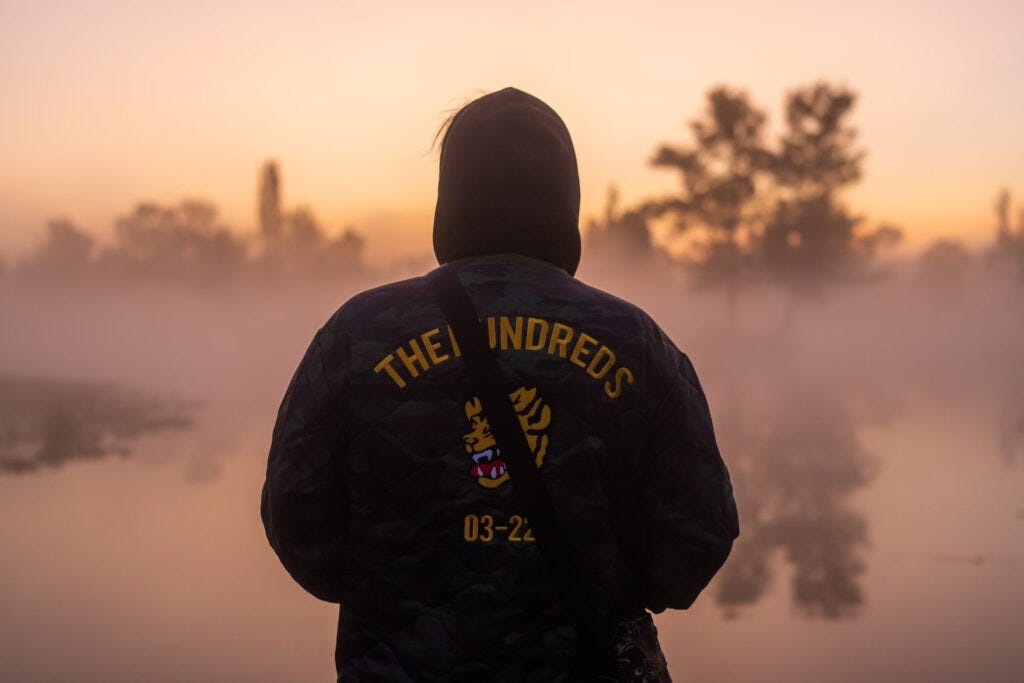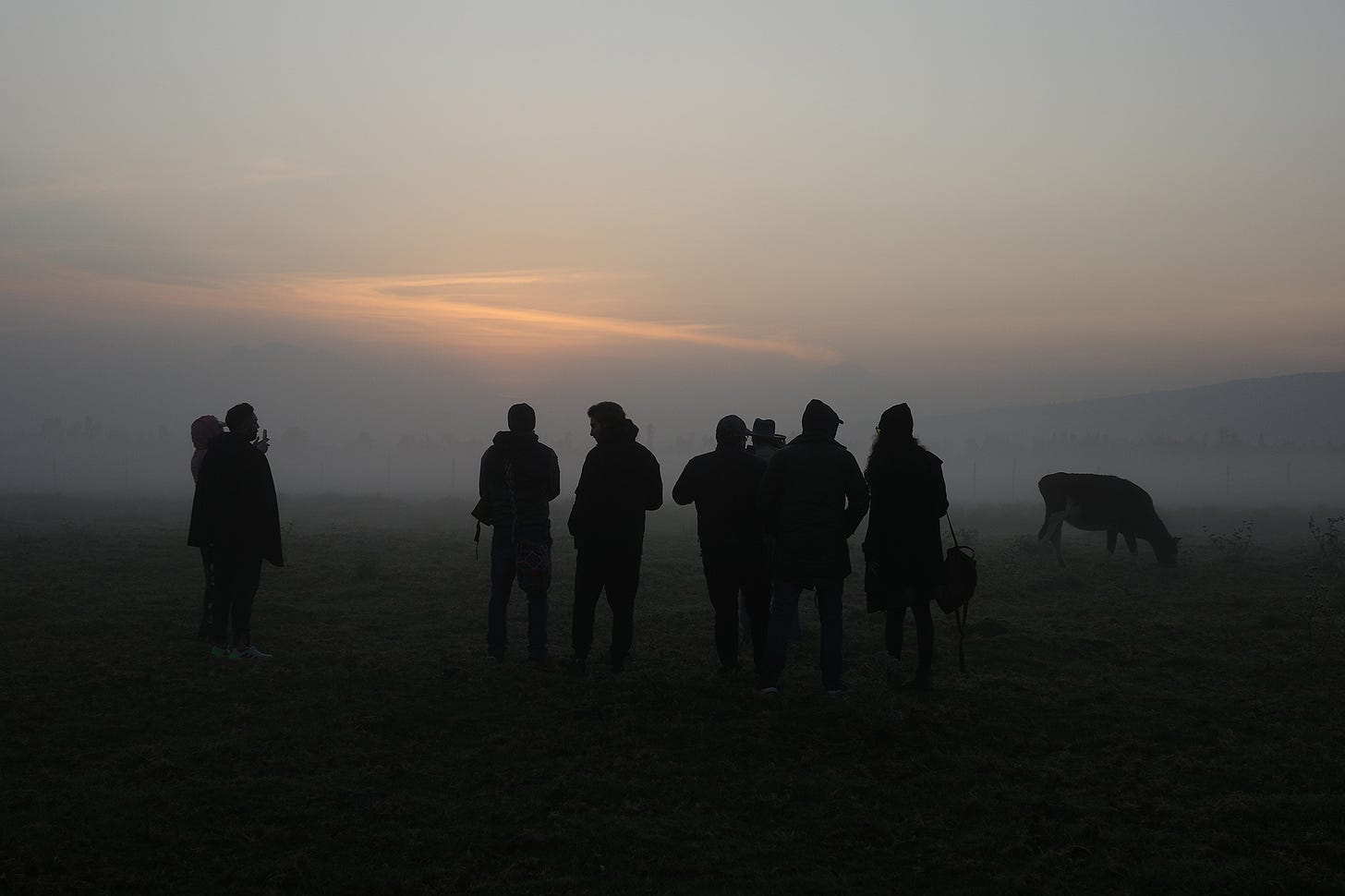The End of Everything
and the start of something...
I have a Substack!
There are practical reasons why. Social media is declining. It’s become increasingly difficult for us to find each other on those platforms, but I think we’ve also learned how thin much of that experience has been. I’ve longed for the days of deeper storytelling and more meaningful connection, back what we used to have in the 2000s with my blog. Plus, e-mail has always proven to be a reliable bridge. It’s like everything is coming full circle.
I also need a home for my daily writing. It’s been over a decade since I’ve had somewhere to effectively hold my thoughts. This is especially ironic when you remember I got my start as a blogger.
If you subscribe, I’ll be visiting you regularly, whether to freestyle about what’s on my mind that day or to publish more thorough, researched pieces that touch on everything from culture to brand-building to streetwear. My name is Bobby Kim aka Bobby Hundreds, co-founder of The Hundreds, a 20-year-old streetwear brand out of Los Angeles. I’m also the author of This Is Not a T-Shirt and an illustrator, writer, and photographer. MONOLOGUE will cover a breadth of topics that captivate me in essay form. There will also be photo blogs, rumination, and loose threads that I’ll be picking at (read more in my ABOUT).
And if you select the paid subscription, I’ll be posting vlogs and short podcasts about what I’ve written for a deeper dive and more thoughtful space.
My first entry, below, was my final essay of 2022. You may have read it already, but I’m re-purposing it here because I feel like it’s the perfect place for everything to end and for us to begin.
Typically, at the close of the year, I peer into the next and am excited about what’s to come. It’s my job to be curious about what’s around the bend and draw inspiration from what’s fomenting on the horizon. Cultural inertia is what keeps the world rotating on its axis, invigorating us with fresh stories, innovation, and faith in the future. Even in the pandemic years, there was hopefulness ahead with the expectations of a subdued virus, milder social climate, and continued economic growth. After all, it couldn’t possibly get worse, could it?
I don’t know if things got worse in 2022, but they certainly got stranger. BLM, antivaxxing, and political tribalism were eclipsed in the headlines by war and an untamed economy. Stimulus money was sapped, and we returned to school, jobs, and society, but the larger discussion brooded around what kind of economic landscape we’d be facing in 2023. The threat of recession and global financial collapse was aggravated by crypto fallout, unflagging supply-chain issues, and a universal ambivalence around work, identity, and purpose. For tech, the mass layoffs began earlier in the year with more than 91,000 workers in the US sector being cut. FinTech is one of the fastest-growing corners of finance, but projections are bleak for its start-ups in 2023, as many companies will be forced to shutter or sell. It goes without saying that NFTs are down bad. Estimates are all over the board, but trading volume on digital collectibles is down 90% year-over-year. Physical collectibles like cards and sports memorabilia have also slumped. Even social media is crumbling, with every platform losing steam, including TikTok, which is past-peak.
Zooming out, many industries like tech - that have historically been leaders - are stuttering, adjusting, or ending in this new environment. Hollywood is still struggling to get back to pre-COVID metrics, down 35% in box office ticket sales from 2019. In TV land, every streaming network has a negative operating cash flow and “the number of scripted series in the US aimed at adults that have been ordered has dropped 24% from the first half of the year… and 40% lower than 2019.” Citing advertising slowdown, BuzzFeed Inc. laid off 180 employees mostly affecting Complex Networks, just two weeks after ComplexCon. Fewer students are applying for college and the for-profit university system is one of the fastest declining industries, with biased admissions standards heavily under review and its affordability in question. Even cannabis is down because of a “weed glut.” In states like Colorado and Michigan, weed prices have dropped by 50-75%.
Inflation, the European energy crisis, war in Ukraine, and revised social marketing algorithms (which have interrupted the DTC boom), are all reasons why the fashion industry is expected to decline next year. Sportswear brands like Nike and adidas are reducing production by 30-40% in 2023. Visit any of your secondhand sneaker stores and you’ll see that resale values are crashing as well. Round Two Hollywood, one of the cornerstones of the decade-long reseller trend, recently closed its doors on Melrose. StockX went through its second round of mass layoffs in November. And pundits are declaring that streetwear is dead once again, but this time, nobody’s up in arms about it. There are no YouTube videos of middle-schoolers debating the topic, no Virgil to point a finger at. Whether streetwear’s lost its spirit because high fashion co-opted it (or was it the other way around?) or the general trend cycle has spit it back out for the millionth time, Business of Fashion declares that “After dominating fashion for the better part of the last decade, streetwear is finally falling out of style.”
So as I gaze into my crystal ball this time, it’s different. I don’t sense the same ebullient enthusiasm or electric urgency about the next twelve months. Having said that, contrary to the funereal headlines, I also don’t feel dread or hopelessness. In fact, I don’t know what to think. Like staring into a blank page with a bad case of writer’s block. When the teacher instructs the student to roam freely, the lack of boundaries and parameters are the most crippling for creativity. Freelancers can empathize – when given open direction, it’s harder to know where to start. There is no precedent to lean on, no reference to rip from, and no guardrails to guide the ball. In this post-pandemic world, we are being called to forge a future out of thin air. And this is why I believe we are on the precipice of a creative renaissance.
In many ways, we truly are beginning with a clean slate in 2023. For better or for worse, institutions are being challenged and toppled (Elon and Twitter, eating less meat, women-led protests in Iran). Antiquated customs are being canceled. Relationships are being re-examined and inherited systems are being dismantled. I was initially attracted to Web3 because of the shared premise that the traditional art world is corrupted, begging the need for a fundamentally different approach. Why can’t artists earn royalties for secondary sales? The same for the fashion industry - Why does sneaker design have to be limited by physics if collectors flaunt them primarily on digital platforms? Why is fashion still constrained to gendered lanes, why aren’t consumers rewarded for promoting the label, how can we more effectively address waste? The first step was admitting there’s a problem. Then, we could fantasize new solutions through radical design, a redefinition of fashion, and a more balanced exchange.
The creative renaissance is happening whether you want it or not. The people are leading the Web3 revolution, but when it comes to AI, the revolution is happening to them. Designing metaverse fashion and digital wearables gets even more interesting – and complicated – with the introduction of mainstream generative AI design programs like DALL-E and Midjourney. Ethics and ownership aside (a deep-dive for a different post), creators are being pushed to adapt with, innovate around, and work alongside Artificial Intelligence assistants who will replace many of their skillsets and daily assignments. Whether you perceive this technological shift as alarming or inspiring, we are once again looking at bulldozing more rituals, patterns, and traditions. For writers, there was no greater upheaval than the Gutenberg press, then the typewriter, the computer, and now ChatGPT. But, does this mean that artists and writers become obsolete?
I don’t think so. Creators will not only persist, but flourish, although the systems around them will reshape. Their methodology, their industry infrastructure, and even their value and purpose may evolve. DSLRs, Lightroom, and Instagram didn’t kill the photographer. In fact, the technology produced more photographers. The competitive market, however, galvanized professional photographers to ideate new ways of making a living off their art (as musicians make money off T-shirt merch and concert admissions, not physical copies of music). Perhaps more profoundly, digital photography and social media reframed how the world considers and consumes photography in their environments. How – and why – we shoot photos has changed. Artists making art is a constant. Art, and what we make of it, is fluid.
The word “renaissance” is defined as a period of birth or rebirth, renewed interest, and revival after a generation of cultural stagnation and downturn. The actual Renaissance followed the dark Middle Ages and the Plague. These times were mired in societal collapse, disease, and breakdown of moral order. Yet, the art that followed was some of the most groundbreaking and significant in world history, not just because of the hard reset on the rules around styles and substance, but because art was also appreciated anew: as science, as mathematics, as tools of power.
Music saw a renaissance of its own after the Great Depression, as did Hollywood and the film industry. Again, these creative booms were preceded by droughts. Entering 2023, you could sympathize that we’re sleepwalking through another dry spell, comfortable and complacent in our artistic grooves. The rawness of human ingenuity has been polished, perfected, and programmed. It’s debatable how long things have been this way. We can point to the redundant iPhone upgrades since Steve Jobs passed and the same, monotonous Big Tech that defined the Social Media Age. All holiday movie posters look alike, and speaking of cinema, after twenty years, the formulaic superhero blockbuster is fizzling. In 2011, Tyler Cowen published The Great Stagnation, arguing that American innovation has drastically abated since the mid-20th Century. From 1880 to 1940, we experienced transformative growth in science, transportation, and education. But, over the last half-century, our economy has decelerated because we’ve hit a technological plateau. Even in other sectors, we’ve heard similar complaints of derivativeness and inactivity. Much of the reason why Virgil Abloh claimed that streetwear was dead in 2020 was in asking, “How many more t-shirts can we own, how many more hoodies, how many sneakers?”
I can’t deny all this disruption and disorder, but I just don’t foresee the death of art or streetwear or any of these other embattled industries and cultures. I do believe, however, that the routines, patterns, and ideologies that reinforce them are being reimagined. Imagination being the key word. If there’s any hope to be gleaned, it’s that without the safety net of history or precedent, our future will be fashioned more and more by sheer, boundless imaginative power. And the good news is, according to a recent set of studies, when we are prompted to use our imaginations, we tend to think about how things could be better. I have spent my career making art, collaborating with other artists, and being humbled by the infinite wellspring of the creative spirit. I have an unshakable faith, a naïve and almost stupid conviction, that humans will figure it out. So maybe it's not the end of everything, but it is the start of something. What that is, I can’t wait to see.
portrait by Dave Krugman
other photography by me
Mexico City, 2022







I love that, in the year of our Lord two thousand and twenty-three, we're all running back to fucking blogs. Feels like absolutely nothing is off the table anymore, doesn't it? It's freeing, in a way. I really do think that you can do or create or launch just about goddamn anything right now and find an audience for it.
The king is dead, long live the king.
So glad to see you here Bobby. You are an inspiration in web 3 and fashion and such an articulate write. Proud of you big brother 💚